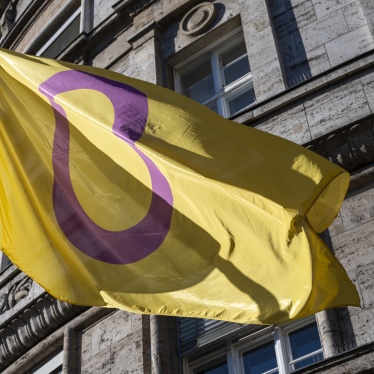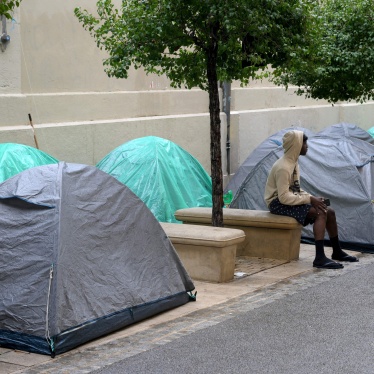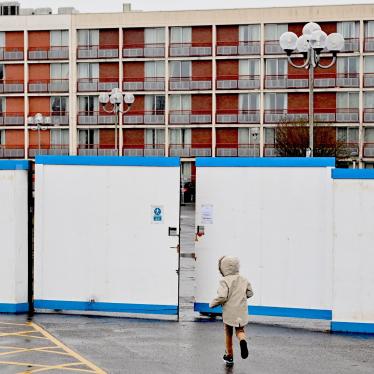June 20, 2016
Dear MP:
We are writing to ask you to ensure that a discriminatory anti-LGBT “propaganda” bill currently before Parliament is withdrawn or rejected and does not become law. On April 28, 2016, members of parliament registered a draft law No. 184 on amending and completing the Code of Administrative Offences and the Law on the Rights of a Child.[1] The proposed legislation includes articles prohibiting so-called “propaganda of homosexual relations among minors.” On June 14, 2016, the draft legislation passed in the parliamentary human rights committee. Human Rights Watch believes that this bill is discriminatory and harmful to all citizens in Moldova, including children, and violates Moldova’s constitutional guarantees and international human rights obligations.
Human Rights Watch is an international nongovernmental organization that investigates and reports on human rights abuses in over 90 countries worldwide. Human Rights Watch urges you to call for the rejection of the bill on the grounds that it is incompatible with a large number of rights protected by international treaties to which Moldova is a party, including those that protect children’s rights.
Discriminatory Draft Legislation
The draft legislation would make amendments to Article 88 of the Code of Administrative Offences and Article 21 of the Law on the Rights of a Child titled “Protection of family by the state.” The law would add a paragraph to Article 21 that reads: “The state ensures protection of a child from the propaganda of homosexuality for any purpose and under any form,” and Article 88 would now contain the following provision: “Propaganda of homosexual relations among minors by means of assemblies, mass media, Internet, brochures, booklets, images, audio-video clips, films and/or audio-video recordings, via sound recording, amplifiers or other means of sound amplification.”
The law imposes fines for individual violators and for organizations found in violation, and would be primarily enforced by the police.
These provisions of the bill violate the protections on freedom of expression and assembly as well as create an environment of state-promoted discrimination against lesbian, gay, bisexual, and transgender (LGBT) people, including LGBT children. It would endanger the work of LGBT human rights defenders. It would threaten the health and well-being of Moldovans, including children, by restricting their access to information necessary for them to make critical decisions about their lives and health, and could potentially have life-threatening effects by censoring accurate information about HIV and AIDS.
The Constitution of Moldova guarantees the rights to freedom of opinion and expression (Article 32), and equality before the law “regardless of race, nationality, ethnic origin, language, religion, sex, opinion, political affiliation, property or social origin” (Article 16). It also protects citizens’ rights to access information (Article 34).[2] All of these guarantees would be severely imperiled by the proposed anti-LGBT “propaganda” legislation. The restrictions imposed on disseminating information about homosexuality are not only disproportionate, but also discriminatory against a particular group and would place unjustified restrictions on freedom of speech and assembly.
Moldova’s Rights Obligations Apply to LGBT People and NGOs
In 2011, during its Universal Periodic Review, Moldova accepted recommendations to prevent discrimination against social minorities, including LGBT people, and adopt a comprehensive anti-discrimination law.[3] In 2012, the European Court of Human Rights ruled that the government of Moldova had violated rights to freedom of assembly and the prohibition on discrimination under the European Convention on Human Rights (articles 11 and 14) when it banned a public protest by a civil society group whose primary purpose is to support LGBT people and provide information about sexual orientation and gender identity.[4] As a party to the International Covenant on Civil and Political Rights (ICCPR), Moldova has an obligation to respect freedom of expression, freedom of assembly, the right to respect for the personal, private, and family lives of individuals, the right to equality, and the ban on discrimination in the enjoyment of those rights. The draft bill currently under consideration violates articles 2, 17, 19, 21, and 26 of the ICCPR.
The bill currently under consideration in parliament is also in flagrant violation of Council of Europe principles. The Council of Europe has long taken a strong stance on the human rights of LGBT people, culminating in the March 2010 unanimous adoption of a set of recommendations by its Committee of Ministers (CM/Rec (2010)5) on measures to combat discrimination on grounds of sexual orientation or gender identity. The recommendations call on member states to ensure that the stipulated principles and measures are applied in national legislation, policies, and practices relevant to the protection of LGBT people. The relevant recommendations are:
- Examine existing legislative and other measures, keep them under review, and collect and analyze relevant data, in order to monitor and redress any direct or indirect discrimination on grounds of sexual orientation or gender identity;
- Ensure that legislative and other measures are adopted and effectively implemented to combat discrimination on grounds of sexual orientation or gender identity, to ensure respect for the human rights of lesbian, gay, bisexual, and transgender persons and to promote tolerance towards them.[5]
In his 2013 report after visiting Moldova, the Council of Europe Human Rights Commissioner recommended that the government strengthen non-discrimination protections to include specific mention of sexual orientation.[6] In 2014, Moldova signed an Association Agreement with the European Union, which included human rights commitments, including “promoting and protecting of children's rights in line with the highest standards in the field.”[7]
International Criticism of Russia’s “Propaganda” Law
As you may know, in 2013, Russia adopted similar restrictive legislation banning “propaganda of nontraditional sexual relations” to children. The adoption of that legislation coincided with the escalation of violent attacks and aggressive harassment against LGBT people in Russia. As Moldova’s ‘propaganda’ bill is similar in content, it is relevant to briefly outline the response to the adoption of this law in Russia, which has drawn significant international criticism.
The purported rationale behind Russia’s federal and regional “propaganda” bans is that the kind of information banned (i.e. that which normalizes same-sex relationships or portrays them as acceptable and of equal value to heterosexual relationships) poses a threat to the intellectual, moral, and mental well-being of children. However, in practice, not only is there no evidence that such information poses such a threat, the offending laws violate Russia’s obligations under international human rights law including Convention on the Rights of the Child (CRC), to which it is a party, as is Moldova.
The Organization for Security and Co-operation in Europe’s (OSCE) representative on freedom of the media[8], the Council of Europe Venice Commission[9], the Parliamentary Assembly of the Council of Europe (PACE)[10], the United Nations Office of the High Commissioner for Human Rights[11], the UN Committee on the Rights of the Child[12], and the European Union[13] expressed profound concern about such discriminatory legislation.
In October 2013, the United Nations Human Rights Committee ruled that a measure banning “homosexual propaganda” adopted by the Ryazan regional legislature in Russia in 2006 was “ambiguous and discriminatory.” The committee reminded Russia of its obligation “to prevent similar violations in the future and [to] ensure that the provisions of the domestic law are made compatible with” articles of the ICCPR.[14]
Additionally, UN Secretary General Ban Ki Moon in his speech on December 11, 2012 condemned legislation that would “criminalize public discussion of homosexuality,” saying “I deplore these kinds of measures wherever they are introduced. They threaten basic rights, feed stigma and lead to more abuse.”[15] In 2015, twelve UN agencies, including the UN Development Programme (UNDP), the UN Children’s Fund (UNICEF), and the UN Population Fund (UNFPA), as well as others that operate in Moldova, issued a joint statement calling for an end to violence and discrimination against LGBT people.[16] UNICEF has said that rather than blocking information about LGBT lives from children, governments should “repeal laws that entrench such discrimination, and in particular those that criminalize…‘promotion’ of homosexuality, or the association of LGBT children and individuals.”[17] On June 7, 2016, the European Parliament’s Intergroup on LGBTI rights took note of the pending anti-gay “propaganda” legislation in Moldova.[18]
Moldova’s Opportunity to Lead
In May 2016, representatives from Moldova’s ministry of education attended UNESCO’s inter-ministerial conference in Paris and Moldova was one of 27 countries to publicly support the call for action to end school-based violence and discrimination based on sexual orientation and gender identity.[19]
In conclusion, we respectfully ask you again, as a member of parliament, to use your influence to help ensure that laws adopted in Moldova are in full compliance with national and international human rights standards. We urge you to use your vote to uphold the rights of all persons in Moldova to fully enjoy the right to freedom of expression—including the right to seek, receive and impart information—without discrimination of any kind.
Sincerely,
Hugh Williamson, Director, Europe and Central Asia Division, Human Rights Watch
Michael Garcia Bochenek, Senior Counsel, Children’s Rights Division, Human Rights Watch
Boris Dittrich, Advocacy Director, Lesbian, Gay, Bisexual, and Transgender Rights Program, Human Rights Watch
CC:
European External Action Service, Moldova desk
EU Commissioner Frans Timmermans
[1] http://www.parlament.md/ProcesulLegislativ/Proiectedeactelegislative/tabid/61/LegislativId/3206/language/ro-RO/Default.aspx
[2] Constitution of the Republic of Moldova, http://www.presedinte.md/eng/constitution
[3] Report of the Working Group of the Universal Periodic Review, Republic of Moldova, 2011, A/HRC/19/18
[4] European Court of Human Rights, Genderdoc-M v. Republic of Moldova (no. 9106/06).
[5] Council of Europe, “Combating discrimination on grounds of sexual orientation or gender identity, 2010, http://www.coe.int/t/dghl/standardsetting/hrpolicy/Publications/LGBT_en.pdf
[6] Report by Nils Muižnieks, Commissioner for Human Rights of the Council of Europe Following his visit to the Republic of Moldova, from 4 to 7 March 2013, https://wcd.coe.int/ViewDoc.jsp?p=&id=2102463&direct=true
[7] European Union-Republic of Moldova Association Agreement, 2014/492/EU, http://eeas.europa.eu/moldova/pdf/eu-md_aa-dcfta_en.pdf
[8] Organization for Security and Cooperation in Europe, “OSCE media freedom representative calls recent legislative initiatives in Russia potentially harmful to freedom of expression and freedom of the media,” June 26, 2013, http://www.osce.org/fom/103121
[9] Council of Europe Venice Commission, “Opinion on the issue of the prohibition of so-called "Propaganda of homosexuality in the light of recent legislation in some Council of Europe Member States, Adopted by the Venice Commission at its 95th Plenary Session (14-15 June 2013),” June 18, 2013, http://www.venice.coe.int/webforms/documents/?pdf=CDL-AD%282013%29022-e
[10] Parliamentary Assembly of the Council of Europe, “Tackling discrimination on the grounds of sexual orientation and gender identity, Recommendation 2021,” June 27, 2013, http://assembly.coe.int/nw/xml/XRef/Xref-XML2HTML-EN.asp?fileid=20011&lang=en
[11] Office of the High Commissioner for Human Rights, “Threatening the rights of LGBT persons in Eastern Europe,” August 14, 2013, http://www.ohchr.org/EN/NewsEvents/Pages/RightsOfLGBTPersonsInEasternEurope.aspx#sthash.7mFtGF36.dpuf
[12] UN Committee on the Rights of the Child, “Concluding observations on the combined fourth and fifth periodic reports of the Russian Federation,” January 31, 2014, CRC/C/RUS/CO/4-5
[13] The European Union, “European Parliament resolution on the upcoming presidential election in Russia,” February 14, 2012, http://www.europarl.europa.eu/sides/getDoc.do?type=MOTION&reference=P7-RC-2012-0052&language=EN
[14] United Nations Human Rights Committee, “Communication No. 1932/2010,” CCPR/C/106/D/1932/2010.
[15] Secretary-General's remarks to special event on "Leadership in the Fight against Homophobia,” December 22, 2012, http://www.un.org/sg/statements/index.asp?nid=6504
[16] Office of the High Commissioner for Human Rights, “Twelve UN agencies issue unprecedented joint statement on rights of lesbian, gay, bisexual, transgender & intersex people,” September 29, 2015, http://www.ohchr.org/en/NewsEvents/Pages/DisplayNews.aspx?NewsID=16511&LangID=E#sthash.8FZKBCv3.dpuf
[17] UNICEF, “Position Paper: Eliminating Discrimination Against Children and Parents Based on Sexual Orientation and Gender Identity,” November 2014, http://www.unicef.org/videoaudio/PDFs/Current_Issues_Paper-_Sexual_Identification_Gender_Identity.pdf
[18] European Parliament, “Moldovan parliament considering ‘anti-propaganda’ bill,” June 7, 2016, http://www.lgbt-ep.eu/press-releases/moldovan-parliament-considering-anti-propaganda-bill/
[19] UNESCO, “Call for Action by Ministers Inclusive and equitable education for all learners in an environment free from discrimination and violence,” May 18, 2016, https://en.unesco.org/sites/default/files/call_for_action_2016_05_18-en.pdf







